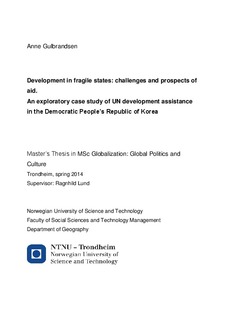Development in fragile states : challenges and prospects of aid. An exploratory case study of UN development assistance in the Democratic People’s Republic of Korea
Master thesis
Published version
Permanent lenke
http://hdl.handle.net/11250/2447138Utgivelsesdato
2014Metadata
Vis full innførselSamlinger
- Institutt for geografi [1119]
Sammendrag
This thesis investigates how the concept of fragile statehood can apply to understanding DPRK as a net recipient of UN humanitarian and development aid, and explores the challenges and prospects of aid efforts in said context. The findings are based on interviews with North Korea and development experts highly experienced with development and humanitarian aid in North Korea. Findings illustrate that DPRK fills many criteria of fragile statehood, and demonstrate how this impacts on absorption and implementation of aid. A lack of trust is found to be a problem both on the part of DPRK as well as in the international community, which is obstructive to planning and implementing aid efforts. Continued UN engagement in the form of development aid is suggested to increase trust, because this increases communication and a process of mutual learning occurs. It is found that the UN comparatively enjoys much trust from the North Korean government and the local population, which eases access and yields limited development results. This thesis may contribute to changing the perception of DPRK as a hopeless development case by shedding light on alternative explanations to its behaviour as an international actor and aid recipient. This is done by exploring the positive as well as the negative experiences of UN (and other) aid agencies; the first of which media and scholars alike tend to neglect.
